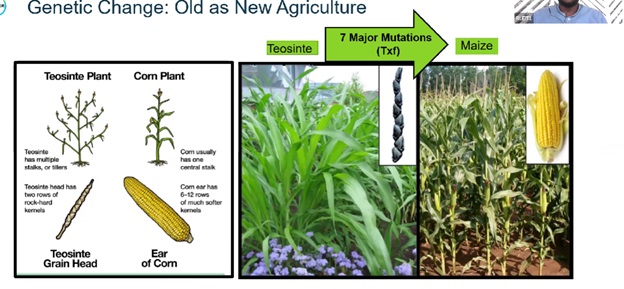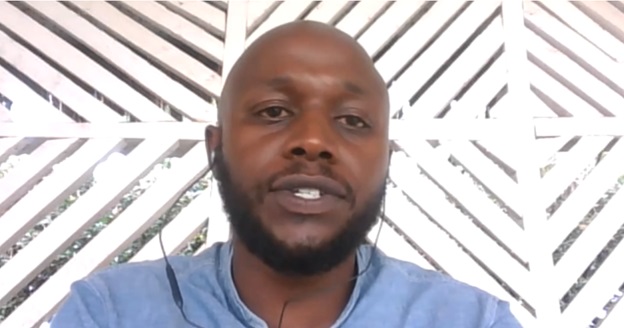Speaking at the webinar, the Senior Research Fellow, Dr. Sylvester Elkana Anami revealed that GMO is good for farmers in Western Kenya, saying that it helps in addressing agricultural challenges such as pest and disease control. It also improves nutritional value thus boosting food security.
"GMO has the potential to increase yield in a small piece of land. This helps our farmers to make profits which improves their livelihoods. GMO is not the only solution to food security, it is a complement to the existing agricultural practices such as organic farming and conventional breeding,” stated Dr. Anami.

Part of the presentation on ‘Genetic Change: Old as New Agriculture’
The Director, Science Park Innovation and Incubation Centre (SPIIC), Prof. John Muoma noted that GM crops are as good as any traditional crop. GM research has undergone a lot of revolution. It is done in restricted laboratories, green houses or confined field trials to prevent contamination of the environment.
"I urge you to appreciate GMO because it is not here to fight other practices and through it we are not going to lose our indigenous seeds," he said.
Concurring with his fellow scientists, the Coordinator, Webometrics and Short Courses, Dr. Dennis W. Ochieno stated that it is the inception of the technology that has affected the acceptance of GMO crops. Further, he said that there is no supporting data to confirm the negative impacts of GMO crops.
“I urge GMO researchers and proponents to provide reliable data to policy makers and the public. Further, I advise GMO researchers to be sensitive to the views of people, especially to matters of indigenous biodiversity and the need to conserve it,” he stated.
Additionally, Dr. Robert Leitich, who presented extensively on ‘Genetic Change: Old as New Agriculture’, stressed the application of Bacillus Thuringiensis (BT) technology in addressing farmanancy. BT is a species of bacteria that produces proteins that are toxic to certain insects.
“We are here to raise awareness, make people informed from a factual point and demystify misconceptions about GMO,” said Dr. Leitich.

Dr. Robert Leitich presenting at the webinar.
However, Prof. Joseph Kimatu challenged his peers saying that the current bio technology infrastructure and corruption atmosphere in Kenya is quite inadequate to either produce or regulate GMO's.
"We should have GMO production procedures and trials articulated in products and labelled with all possible side effects," he added.
Other notable scientists who participated in the debatable webinar included Dr. Jairus Odawa, Chairperson, Department of Biological Sciences- Dr. Philip Ogutu, and Dr. Vitalis Ogema.
The argument that we need GMO food to feed the entire world population is absurd. The GMO debate is an area that will require researchers to continue burning the midnight oil to demystify the fears associated with it that have deepened in the minds of farmers. The adoption of GMOs, can help avert food crisis and attendant social turmoil amid a rapidly rising global population that is currently experienced in our country.




 Crops, the Right Path to Pursue,”- Scientists at the MMUST Webinar Dispell GMO Myth.jpg)
